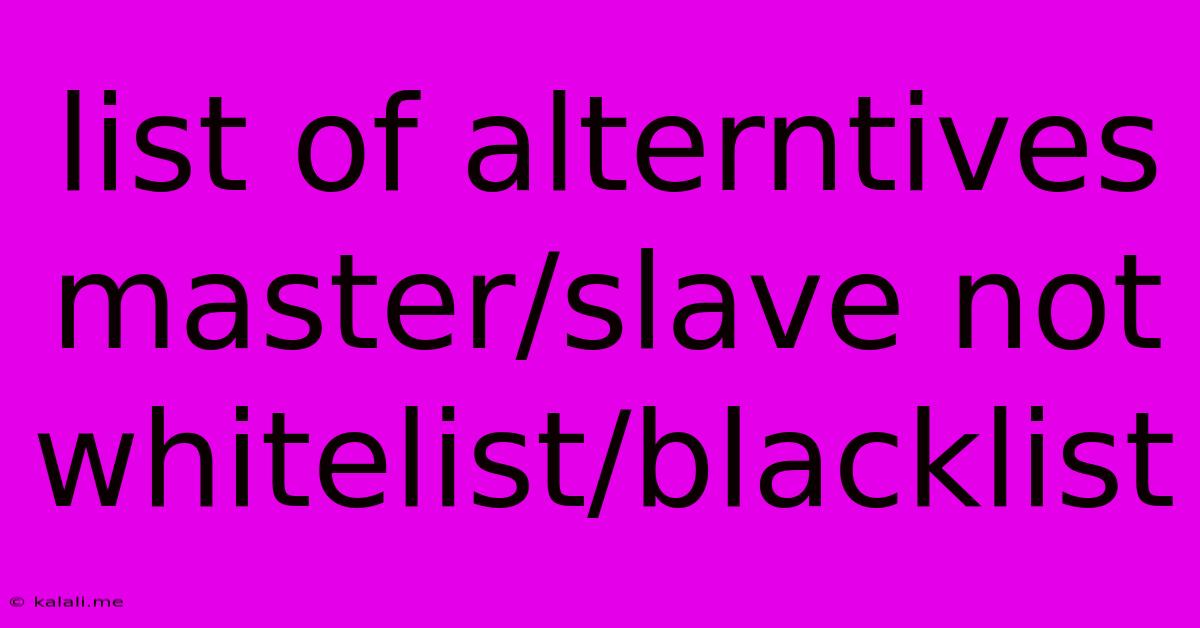List Of Alterntives Master/slave Not Whitelist/blacklist
Kalali
Jun 07, 2025 · 2 min read

Table of Contents
Beyond Master/Slave and Whitelist/Blacklist: Inclusive Terminology Alternatives
The tech world is increasingly recognizing the need for inclusive language. Terms like "master/slave" and "whitelist/blacklist" are outdated and carry problematic historical connotations. This article explores a range of suitable alternatives, emphasizing their improved clarity and inclusivity. This guide will help you avoid offensive terminology and create more welcoming and accessible content.
Why Replace Master/Slave and Whitelist/Blacklist?
The terms "master" and "slave" evoke painful associations with slavery and oppression. Similarly, "whitelist" and "blacklist" perpetuate a discriminatory system that arbitrarily categorizes entities as "acceptable" or "unacceptable." Using these terms can be deeply offensive and alienating to your audience. Moving towards more neutral and precise language is crucial for fostering a more inclusive tech community.
Alternatives to "Master/Slave":
The ideal replacement depends heavily on the specific context. Consider these options:
- Primary/Secondary: This is a common and widely accepted alternative, clearly defining the hierarchy without offensive implications. It works well for describing primary and backup servers, for example.
- Leader/Follower: This option emphasizes the collaborative nature of the relationship, suitable for distributed systems where one node leads and others follow.
- Controller/Controlled: Appropriate when one component directly controls another, clearly indicating the relationship's nature.
- Manager/Managed: This reflects a supervisory relationship, suitable for situations where one entity manages the resources or behavior of another.
- Source/Target: Useful in contexts focusing on data flow or communication, identifying the origin and destination of information.
- Main/Auxiliary: Similar to primary/secondary, this option differentiates the primary and supporting components clearly.
Alternatives to "Whitelist/Blacklist":
These terms also require careful consideration of context:
- Allowlist/Denylist: This is the most straightforward and widely adopted replacement. It clearly communicates the intended function while removing the negative connotations.
- Include list/Exclude list: This emphasizes the action taken on the listed items – inclusion or exclusion – making the meaning very transparent.
- Approved list/Blocked list: This is a more user-friendly option, emphasizing the status of the listed items.
- Permitted list/Restricted list: These terms clearly convey the permissions associated with the listed items.
- Positive list/Negative list: A more formal approach focusing on the positive or negative selection criteria.
Choosing the Right Alternative:
Selecting the best alternative hinges on the specific context. Consider:
- The nature of the relationship: Is it hierarchical, collaborative, or supervisory?
- The function of the list: What are the items being listed, and what action is being taken based on the list?
- The intended audience: Consider the audience's level of technical understanding and cultural sensitivities.
By using these inclusive alternatives, you contribute to a more welcoming and equitable technology landscape. This not only reflects positively on your organization but also enhances clarity and understanding for all users. Remember, choosing inclusive language is essential for creating a positive and productive environment for everyone.
Latest Posts
Latest Posts
-
Should You Use Your Sitename In Keywords Seo
Jun 07, 2025
-
How To Remove Broken Wheel Nut
Jun 07, 2025
-
Will He Find Faith On The Earth
Jun 07, 2025
-
Through Me For A Loop Meaning
Jun 07, 2025
-
How To Delte Everything After Double Barline Sibleius
Jun 07, 2025
Related Post
Thank you for visiting our website which covers about List Of Alterntives Master/slave Not Whitelist/blacklist . We hope the information provided has been useful to you. Feel free to contact us if you have any questions or need further assistance. See you next time and don't miss to bookmark.